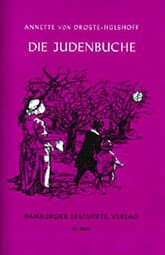The Jews' Beech Tree
Critique • Quotes
 1900 German edition
1900 German editionOriginal title
Die Judenbuche
Also known as
The Jew's Beech
First publication
1842
Literature form
Novella
Genres
Literary, crime, mystery
Writing language
German
Author's country
Germany
Length
Approx. 20,000 words
Mystified in old Westphalia
Coming out a year after The Murders in the Rue Morgue, The Jews' Beech Tree is considered one of the first crime or mystery works. But while Edgar Allan Poe's story is obviously seminal as detective fiction, Annette von Droste-Hülshoff's dark tale is more difficult to place in the nascent genre.
The novella has no sleuth sorting evidence or reasoning toward solving its two murders. There is hardly any law at all in the Westphalian woods and hills of the 1700s, apart from the norms of the medieval German village. Gossip, superstition, jealousies and prejudice determine what passes for justice.
Nor is there a protagonist's point of view to filter the details through to the reader. The herder Frederick Mergel is the central character whose life we follow intermittently. But we are never really inside his head. We never really know how complicit he is in the nefarious activities or how much he may be victimized. For long stretches he even disappears from sight and for at least one period, he seems to be replaced by a look-alike.
It is not clear the murders are ever solved correctly in The Jews' Beech Tree, though by the end of the novella a rough kind of karma appears to have been achieved.
But about that famous ending. Its ambiguity represents more than the author simply holding back on revealing the killer or killers, teasing the reader with an inconclusive conclusion. And it's not a take on the "The Lady or the Tiger?" game, asking readers to write their own ending.
The writer Droste-Hülshoff is reporting the case objectively but sensitively, delving into the give and take of village life, telling us what people witness, what they hear, what they fear, how they react. She's never a voice-of-God narrator. She may suspect more than she is telling, but as the storyteller she relates no more than the various characters themselves know of what is going on. Leaving us in the same position.
More primitive times
The Jews' Beech Tree is supposedly based on actual events, the real-life killings in Westphalia of a forest ranger and a Jewish moneylender, who in this story had sold Frederick a watch on credit and was demanding payment. As you can imagine, this plot offers Droste-Hülshoff scope to expose local prejudices of the time, including anti-Semitism. To her credit though, this too is reported dispassionately. She writes with incredible nuance of this more primitive, and seemingly simpler, time and place.
There are times reading the story I have to stop and go over passages again to figure out what's happening. Not because the writing is obtuse, but because the customs of the characters are so different from ours today that their motivations are not always apparent. The author never patronizes, never translates her characters for more sophisticated readers. She just lays it out: this is who they are, this is how they live, make of it what you will.
Some elements of the story would place it in the Gothic mystery tradition: dark and scary scenes in isolated settings, thunderstorms, doppelgängers, grisly killings, curses, and a hint of the supernatural. But there is no haunted castle or manor house with a mad woman in the attic. Nor is there any implied sexual romance with a damsel in distress.
The heart of the story is more grittily realistic than grandly romantic. The subtitle of the novel when it was first published was, in translation, something like "manners and customs from the mountain region of Westphalia," indicating the kind of story the author thought she was telling.
Annette von Droste-Hülshoff was known mainly as a poet in her times and wrote little other fiction. But her one novella is a classic, endlessly mystifying.
— Eric
Critique • Quotes

